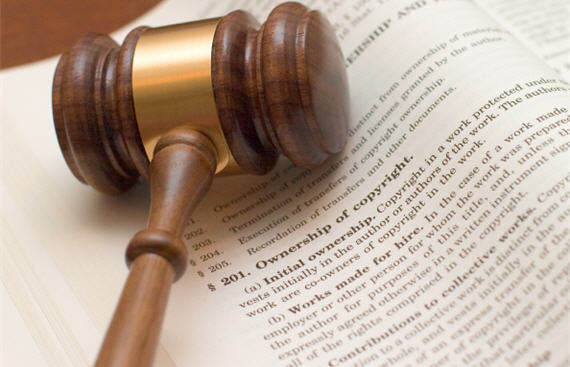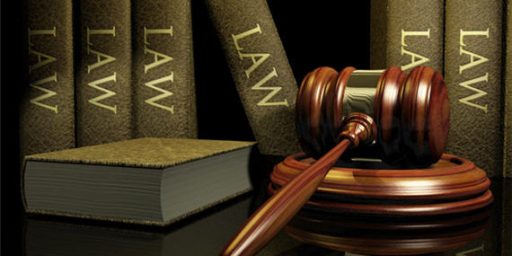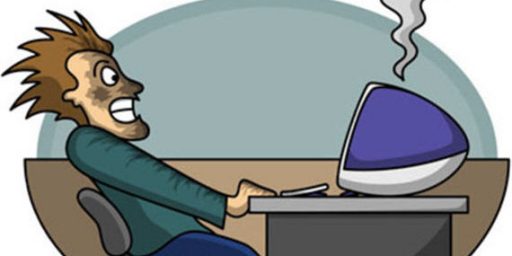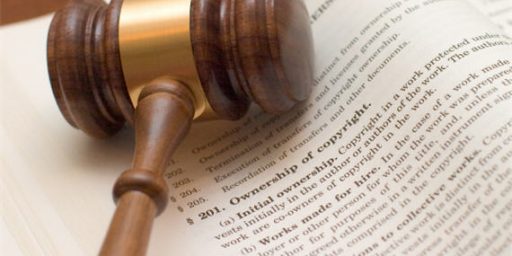Federal Judge: Copying An Entire Article Can Be “Fair Use” Under Copyright Laws
For the second time in two weeks, copyright lawsuit mill Righthaven has suffered a loss in Federal Court.
A Federal Judge in Nevada has handed another loss to copyright lawsuit mill Righthaven LLC and, in the process, a major victory for bloggers on the issue of “fair use” of copyrighted works:
A federal judge ruled Monday that publishing an entire article without the rights holder’s authorization was a fair use of the work, in yet another blow to newspaper copyright troll Righthaven.
It’s not often that republishing an entire work without permission is deemed fair use. Fair use is an infringement defense when the defendant reproduced a copyrighted work for purposes such as criticism, commentary, teaching and research. The defense is analyzed on a case-by-case basis.
Monday’s ruling dismissed a lawsuit brought by Righthaven, a Las Vegas-based copyright litigation factory jointly owned with newspaper publisher Stephens Media. The venture’s litigation tactics and ethics are being questioned by several judges and attorneys, a factor that also weighed in on U.S. District Judge Philip Pro’s decision Monday.
Righthaven has sued more than 200 websites, bloggers and commenters for copyright infringement. More than 100 have settled out of court.
The lawsuit decided Monday targeted Wayne Hoehn, a Vietnam veteran who posted all 19 paragraphs of November editorial from the Las Vegas Review-Journal, which is owned by Stephens Media. Hoehn posted the article, and its headline, “Public Employee Pensions: We Can’t Afford Them” on medjacksports.com to prompt discussion about the financial affairs of the nation’s states. Hoehn was a user of the site, not an employee.
Righthaven sought up to $150,000, the maximum in damages allowed under the Copyright Act. Righthaven argued that the November posting reduced the number of eyeballs that would have visited the Review-Journal site to read the editorial.
The judge’s opinion, which I’ve embedded below, is a worth reading if only because it presents a fairly concise analysis of the application of the law of fair use, which is always dependent on the facts of a particular case, to the manner in which the copyrighted work was used in this case:
“Righthaven did not present any evidence that the market for the work was harmed by Hoehn’s noncommercial use for the 40 days it appeared on the website. Accordingly, there is no genuine issue of material fact that Hoehn’s use of the work was fair and summary judgment is appropriate,” Judge Pro ruled.
Marc Randazza, one of Hoehn’s attorneys, said he would petition the judge for legal fees and costs.
The judge also said he took into consideration that only five of the editorial’s paragraphs were “purely creative opinions” of the author.
“While the work does have some creative or editorial elements, these elements are not enough to consider the work a purely ‘creative work’ in the realm of fictional stories, song lyrics, or Barbie dolls,” he wrote. “Accordingly, the work is not within ‘the core of intended copyright protection.'”
Judge Pro, in his fair-use analysis, also found that the posting was for noncommercial purposes, and was part of an “online discussion.”
This is the second court defeat for Righthaven in as many weeks. Last week, another Nevada Federal District Court Judge dismissed a copyright infringement suit that the company had filed against Democratic Underground on the ground that Righthaven lacked standing to enforce the copyright under Federal Law because he did not have an exclusive license from the copyright owner. Judge Pro also ruled against Righthaven on that ground in this case, but it’s his ruling on the Fair Use that is likely to get the most notice. While every Fair Use case is different, this ruling makes clear that, under the right circumstances, even wholesale copying of the a copyrighted work for the purposes of commenting on it can be considered acceptable. If that’s the case, then the the copy-paste-and-comment that is typical of the blogging world is clearly acceptable under copyright law. Righthaven seems to base it’s claims on some idea that copying more than some small portion of a work is per se a copyright violation, and it’s used that interpretation of the law to intimidate people into settlements for several years now. It’s nice to see the Courts are slapping them back from that ridiculous position.
Here’s the opinion itself, like I said it’s short and well worth a read by anyone interested in the subject:







It might be a good time–though late–for RightHaven and Stephens Media to put down the shovel, quit digging, and hope to discover a path that gets them out of the way of the counter-suits (if not class action suit) that are about to descend upon their pointy little heads.
Well if Righthaven can get the case to the Supreme Court then Scalia and co. will certainly reverse the decision.
It seems to me that the significance of this case is that the court expected RightHaven to provide proof of harm. Simple infringement wasn’t enough. If this decision withstands appeal or is cited by judges other than the one guy in Nevada, the next step is how this is reconciled with other related intellectual property rights cases.
Dave,
… and there is the rub, since the whole idea of IP has been excavated out of whole cloth to be something far and away beyond what the founders had in mind (specifically a very limited protections so that creators will keep creating), it seems to me that this ruling has a number of avenues for reversal base on the whole concept that the “owners” of IP are entitled to their rent seeking. The Idea that anything intellectual can even be property is just so much nonsense it’s remarkable to me that it ever got any traction at all (unless of course your someone who has something to gain from said rent seeking).
To me there are a number of fundamental ideas that have creep into the judicial system that are repugnant to the operation of a free society of which the concept of IP is one. The others are: Money = speech and Corporations are legal persons. We would do well to banish these from current jurisprudence but unfortunately they seem to have a lot of currency with those who have obviously not thought about it too deeply.
One has to wonder how much web traffic all those newspapers lost when they started the lawsuits. Smart sources nowadays know that the new media can point lots of traffic their way, from small papers and local TV news up to the big boys, like the Times and Washington Post. The NY Times even has a few ways to make it easy. Many offer automatic embedding of the link when you C&P.
Copying the whole article, though, seems wrong. It is also a big no no in the blogosphere.